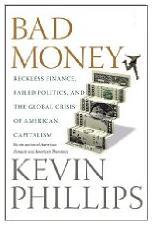Rise of the Technocrat
Phillips begins by asking you to think of the U.S. economy as if it's in a shark tank and there are 7 sharks attacking. The first shark is the 'Financialization' of the U.S. economy. Finance is defined as the debt/credit and insurance industries. The financial instruments market overtook the real physical economy of manufacturing and production of goods.
A major component of financialization is securitization of financial instruments. The subprime mortgage problem is the result of securitization of mortgages.

"Financialization means that instead of having a solid sober, dominant sector of the economy, we have a very innovative, speculative, very much grown in the last decade - experimental even [financial sector] sometimes it seems we have banks that have merged with casinos. Roulette wheel on one side, tellers cage on the other." Kevin Phillips
If instead of 'Financialization' of the economy, Mr. Phillips had called it 'Digitalization' of the U.S. economy, it would have been easier to see that the remaining 6 sharks derive from the first shark - Digitalization of the U.S. economy.
When the automation of business processes began in roughly the 1960s, it was for the purpose of greater efficiency, cost reduction and better service. In manufacturing, the automation was to make the assembly lines run faster and smoother. In the financial services industries - like insurance, the goal was greater accuracy in the calculation of risks so they could cover the insured and have a margin of profit. By the 1980's, the increased profits from the management of costs and risks led to a shift in focus away from the actual business - whatever it was towards information as a goal. This reorientation in the nature of business went largely unseen because it occurred at the administrative level in corporations. One could call it the era of the Rise of the Technocrats and their Information Systems.
The easiest business to understand the significance of this is to look at insurance companies. They insure against risk. They pool the premiums, calculate the odds of having to pay out claims for the covered risks and offer coverage at a level where they can cover the claims and make a profit. Enter computer systems, statisticians and fine print. "Your homeowners insurance will cover a caved in roof due to snow only if the event takes place between March and November. Events occurring in December to through February are not covered." This example is obvious but the number of places where shavings of cost-expense reductions can occur are limited only to the imagination of the Technocrats who calculate the risks and those who design systems to shift the risk. And that is what happened to Wall Street and the stock market.
Wall Street is Technocrat Central. It is a place that trades other people's money and they take a cut for doing it so they have no skin in the game in terms of the 'real economy'. Their business is just digits in a computer and at the end of the day, they are rewarded for plus side numbers regardless of what is happening in the real economy.
Wall Street moves those digits at the speed of light. Regulators and auditors move at human speed as they are trying to understand complex problems. When one considers the risk of committing financial fraud, it's not difficult to see that the calculations are that Wall Street can be as crooked as they want to be because the odds are in their favor. If you are gaming the system, time is a major factor. You don't need a game to be in place for a long period of time, all you need to do is to create an illusion of something solid, investors flock to that illusion - and you execute the sting - take the money and run. Consider the Enron energy trading scam. It took years to figure out exactly what happened. And... what was the outcome for that game? Two guys went to jail? The harshest sentence was 10 years in jail - for billions of dollars stolen, 10's of thousands of lives ruined and chaos in the electric supply system that will be felt for years to come. For the dot.con scam, there was a similar outcome. Less than a half dozen people went to jail; billions of dollars were stolen and the thieves got away clean with the money.
What to do about it?
Kevin Phillips defined the problem beautifully - including the fact that the people who are advising our government on what needs to be done to fix the problem are the leaders who created the problem. There will be no real solutions coming from them and you can make book on that.
The U.S. economy has become
a virtual economy of digits being shuffled around in
computers so the first thing that should
be done is to put Wall Street and the banksters in touch
with reality. That must change. We need to
return to a solid economy build on a foundation of
production - first to serve our own needs and then any
excess - if any - to be sold globally.
Pass a new corporate racketeering law - with no statute of limitations. If a corporation is found guilty of racketeering, all officers and board members of the corporation go to jail -------- with him --------------> and include forfeiture of their personal assets as a part of the punishment.
Pass a law limiting foreign ownership to 40% in American corporations and that the business must be totally within the borders of the United States to qualify for any tax deductions or credits. Outlaw lobbying by associations like the Chamber of Commerce and the Business Roundtable.
Define economic warfare as a crime and outlaw foreigners from lobbying the U.S. Congress for anything. They seem to have forgotten that they exist to represent the interests of the American people. In no other area is that more clear than on the H-1B issue that allows the importation of

Factor that into your risk
management calculations.
foreigners to take American jobs. Those types of visas should be outlawed and the programs to import foreign students to American Universities should be halted. Because foreigners are being used as arbitrage against the American people.
The entire U.S. trade policy is working against the interests of America. This has to change. The U.S. economy should be benefiting the American people - not foreigners and foreign countries and multinational corporations. Congress needs to change the tax laws to penalize the export of production from this country rather than reward it. Corporate reports should include only income earned from production in the United States. Corporate reports that include production in a foreign country and sales in this country are distorting the true financial picture of the U.S. economy.
Securitization (bundling) of financial instruments should be outlawed. Lending institutions - regardless of what type, should assume the risk for that lending. Insurers should assume the risk for what they insure without passing it off to other people through securitization.
The government should hire
an army of auditors and investigators and they should pursue
criminal charges against the perpetrators of fraud in the
securitization of subprime mortgages. We have to bring
integrity back to our financial system and that's the only
thing that will work to restore the U.S. economic system.
October 11, 2008